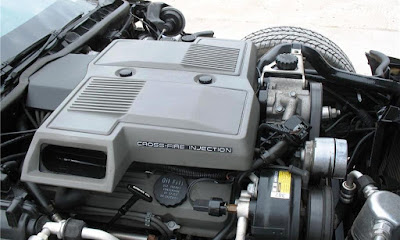Corvette 427 Big-Block
Back in 1965, Chevrolet decided to get innovative and give the public something they had been craving—a small sports car with a huge motor. Corvette would be the first sports car to drop a big-block motor into a sports car, and consumers were intrigued and loved it.
Making the 396 Bigger
Chevrolet created a feasible 427 cu.-in. motor for the Vette by taking the already powerful Chevrolet 396 cu.-in. motor and machining the bore and stretching the stroke of the block to a larger 427 cu.-in. This is the same way the legendary Chevrolet 327 cu.-in. engine came about. The Corvette's original 289 block was bored and stroked to a 327.
 |
| Big Block Hood |
427 Big-Block Engines Were Available in Two Versions:
- L36 390 horsepower
- L72 425 horsepower
Both engines were available choices given to consumers when ordering a Vette, and both engines performed sensationally depending on what kind of fun you were looking to have.
The Extra Cost for the 427 Big-Block
- The lower output L36: $185.00 Extra
- The higher output L72: $350.00 Extra
What Came With The High Output L72
The extra cost for the L72 would get you a better-structured motor that included:
- Four-bolt mains
- Larger oil fitting ports
- Impact-extruded aluminum pistons (11.0:1) compression
- More aggressive solid lifter camshaft
- Larger rectangular port cylinder heads
- Aluminum intake
- Holly 780 CFM carburetor
- Free-flowing exhaust manifolds
- And a K66 transistorized ignition to help complement the other higher output parts.
Although the L72 was rated at a massive 425 hp, it was a well-known fact the actual horsepower output was well above that publicized rating. The reason for Chevrolet's deception on horsepower numbers was to avoid unwanted backlash from the safety legislation.
A Pleasing Power-to-Weight Ratio
The 427 big-block Chevrolet motors were a tight fit for the Corvette, but the power-to-weight ratio was very pleasing for speed freaks. Plus, the much cooler big-block hood that came with the Corvette to make room for clearance, told people what was under the hood. Chevrolet would spend about six more years using a big-block powerplant as an option for Corvette consumers.All Good Things Must Come to an End!
After 1972, the change to bring about more fuel-efficient cars would change what kind of powerplants all muscle cars would receive. This new change would eventually spawn the end of an era, the "Muscle Car" era.
Small-block 350s de-tuned and ready to do poor performance was what the American car enthusiast would have to put up with for power through the mid-'70s and '80s. In the late '80s and early '90s, change for more power started up again, and since then, there hasn't been much reason to complain.


